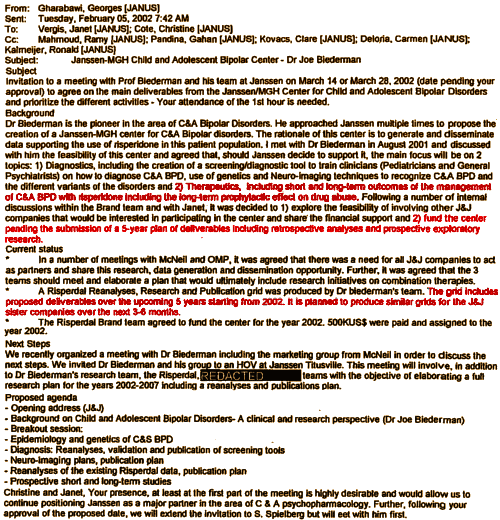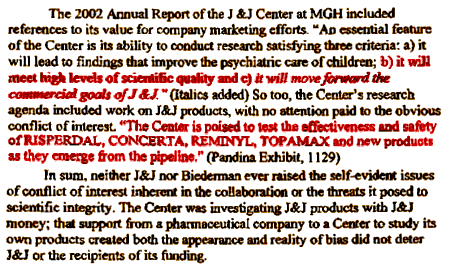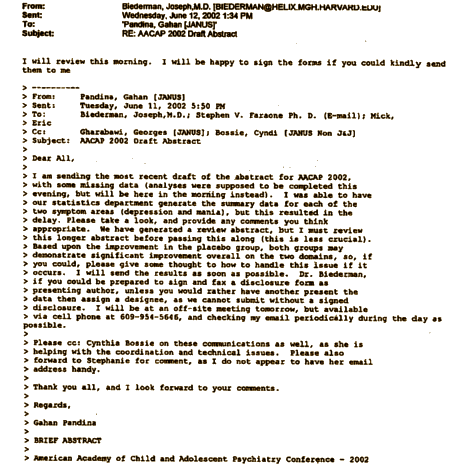a retrospective chart review
by Frazier JA, Meyer MC, Biederman J, Wozniak J, Wilens TE, Spencer TJ, Kim GS, and Shapiro S
Journal of the American Academy of Child and Adolescent Psychiatry. 1999 38(8):960-5.
OBJECTIVE: To investigate the effectiveness and tolerability of the atypical neuroleptic risperidone in the treatment of juvenile mania.METHOD: This is a retrospective chart review of outpatients with the diagnosis of bipolar disorder (DSM-IV) treated with risperidone at a university center. Response to treatment was evaluated using the Clinical Global Impression Scale (CGI) with separate assessments of mania, psychosis, aggression, and attention-deficit/hyperactivity disorder (ADHD).RESULTS: Twenty-eight youths (mean +/- SD age, 10.4 +/- 3.8 years) with bipolar disorder (25 mixed and 3 hypomanic) who had been treated with risperidone were identified. These children received a mean dose of 1.7 +/- 1.3 mg over an average period of 6.1 +/- 8.5 months. Using a CGI Improvement score of < or = 2 (very much/much improved) to define robust improvement, 82% showed improvement in both their manic and aggressive symptoms, 69% in psychotic symptoms, but only 8% in ADHD symptoms.CONCLUSIONS: Although limited by its retrospective nature, this study suggests that risperidone may be effective in the treatment of manic young people and indicates the need for controlled clinical trials of risperidone and other atypical neuroleptics in juvenile mania.
-
"…including short and long-term outcomes of the management of C&A BPD with Risperidone including the long-term effect on drug abuse."
-
"…fund the center pending the submission of a five year plan of deliverables including retrospective analysis and prospective exploratory research."
-
"The grid includes proposed deliverables over the upcoming five years starting from 2002. It is planned to produce similar grids for the sister companies over the next 3-6 months."
Then along came Senator Grassley in June 2008:
Researchers Fail to Reveal Full Drug Pay
New York Times
By GARDINER HARRIS and BENEDICT CAREY
June 8, 2008A world-renowned Harvard child psychiatrist whose work has helped fuel an explosion in the use of powerful antipsychotic medicines in children earned at least $1.6 million in consulting fees from drug makers from 2000 to 2007 but for years did not report much of this income to university officials, according to information given Congressional investigators. By failing to report income, the psychiatrist, Dr. Joseph Biederman, and a colleague in the psychiatry department at Harvard Medical School, Dr. Timothy E. Wilens, may have violated federal and university research rules designed to police potential conflicts of interest, according to Senator Charles E. Grassley, Republican of Iowa. Some of their research is financed by government grants…
In one example, Dr. Biederman reported no income from Johnson & Johnson for 2001 in a disclosure report filed with the university. When asked to check again, he said he received $3,500. But Johnson & Johnson told Mr. Grassley that it paid him $58,169 in 2001, Mr. Grassley found. The Harvard group’s consulting arrangements with drug makers were already controversial because of the researchers’ advocacy of unapproved uses of psychiatric medicines in children…
Dr. Biederman is one of the most influential researchers in child psychiatry and is widely admired for focusing the field’s attention on its most troubled young patients. Although many of his studies are small and often financed by drug makers, his work helped to fuel a controversial 40-fold increase from 1994 to 2003 in the diagnosis of pediatric bipolar disorder, which is characterized by severe mood swings, and a rapid rise in the use of antipsychotic medicines in children. The Grassley investigation did not address research quality…
When a Congressional investigation revealed in June that Dr. Joseph Biederman, a world-renowned child psychiatrist, had earned far more money from drug makers than he had reported to his university, he said that his interests were “solely in the advancement of medical treatment through rigorous and objective study.” Court documents reveal that Dr. Joseph Biederman, a renowned child psychiatrist, pushed Johnson & Johnson to fund a research center whose goal was “to move forward the commercial goals of J&J.”
But e-mail messages and internal documents from Johnson & Johnson made public in a court filing reveal that Dr. Biederman pushed the company to finance a research center at Massachusetts General Hospital, in Boston, with a goal to “move forward the commercial goals of J.& J.” The documents also show that the company prepared a draft summary of a study that Dr. Biederman, of Harvard, was said to have written.
Dr. Biederman’s work helped to fuel a fortyfold increase from 1994 to 2003 in the diagnosis of pediatric bipolar disorder and a rapid rise in the use of powerful, risky and expensive antipsychotic medicines in children. Although many of his studies are small and often financed by drug makers, Dr. Biederman has had a vast influence on the field largely because of his position at one of the most prestigious medical institutions…
Wall Street Journal
By JENNIFER LEVITZ
December 30, 2008Joseph Biederman, a top researcher on the use of psychiatric drugs in children, agreed to stop participating in several industry-funded drug trials and curb other activities pending the outcome of a Boston hospital’s inquiry into his potential conflicts of interest and disclosure obligations. The deal, announced Tuesday by Massachusetts General Hospital, where Dr. Biederman conducts research, followed several allegations related to his relationships with drug companies. Dr. Biederman has been a prominent backer of childhood use of Johnson & Johnson’s Risperdal, a top-selling antipsychotic drug.
A U.S. Senate review found that Dr. Biederman had received $1.6 million in payments from drug companies between 2000 and 2007 while reporting only a fraction of that amount to Harvard University, where he is a faculty member. Separately, Massachusetts General has said it was concerned that an institute that Dr. Biederman and J&J worked together to create at the hospital was used to promote Risperdal’s use in children, rather than for scientific or educational purposes…
In its statement, Massachusetts General said Dr. Biederman would stop industry-funded activities at the hospital until its review was completed. Hospital spokeswoman Peggy Slasman said that would mean Dr. Biederman would discontinue his participation in several industry-funded clinical trials there. The hospital declined to describe the studies, which it said would continue under a different doctor…
Sen. Chuck Grassley[ R-Iowa] has tenaciously gone after what he sees as conflict of interest in the medical field, focusing closely on psychiatry. In the latest volley in his investigation into Dr. Joseph Biederman of Harvard University, Sen. Grassley said he was provided documents as part of ongoing litigation that appear to demonstrate that Dr. Biederman was acting in tandem with Johnson & Johnson to promote Concerta and other psychopharmacologics for off-label uses. Sen. Grassley sent a 63-page missive to the presidents of Harvard and the Massachusetts General Hospital outlining numerous apparent conflicts, including that Dr. Biederman was receiving $500,000 in grant money from the National Institutes of Health while he was running J&J’s Center for Pediatric Psychopathology Research…



Thank you for dissecting Biederman, SO necessary. There was a protocol breach in Risperdal trial and this post has the letter from Grassley asking abt it, not sure if youve seen that
http://t.co/jNgOf30
I began a series, titled 1999-2008 OCD-ADHD-Bipolar the evolution of a diagnosis and its part of that….I began that series to show a connect the dots w key players and pharma cos and abstracts to show readers how (kids) like my daughter ended up rolled by that Biederman regime over at Harvard. It was how I began to see it unravel before my eyes, the names all repeat themselves, over the years the latest and greated new antipsychotics arrive, in order they were marketed then prescribed to my daughter….then the databases w doctor income frm pharma, and all of the info expanded, it is with all of this knowledge and then a blog like yours that takes it into parts….just about proves we are not alarmists or conspiracy theorists or antipsychiatry ppl like they say….its all fact based learning, and I learned all of this and it equaled out to high skepticism of pharma and psychiatry, in the end who to trust is a wild card.
Biederman is a rich topic, he is also on the scientific advisory board at pro bipolar child CABF bpkids parent advice advocacy site….they really should clean up their board and removed conflicted KOLs, he has friends on that board, delBello, Wozniak, so many of them and even some paxil 329 authors to boot! corrupt KOLs always find work!
Apologies that link copied in my comment above is the wrong one this is the one w Grassley questions to Biederman
http://bipolarsoupkitchen-stephany.blogspot.com/2009/04/protocol-breach-reported-in-biederman.html
[…] Posted by admin on Jun 30, 2011 Mickey explains! […]
Off-topic, but relevant to the blog in general. Spine journal devotes an entire issue to criticizing fraudulent research into bone growth factors and uncovering the corporate bias behind the faulty conclusions.
More info: http://chronicle.com/blogs/brainstorm/the-spine-journal-reduces-industry-sponsored-infuse%C2%AE-publications-to-bone-meal/36707?sid=at&utm_source=at&utm_medium=en
One would expect a 40 fold increase in the diagnosis of pediatric bipolar to age into a similar increase for adult bipolar, but that has not been the case. The rates for adult bipolar have stayed between 1% to 4%, depending on whether one is using the DSM-IV definition, or the spectrum model.
In my opinion, bipolar is being “caught” earlier and cases that would have been misdiagnosed as depression before are being correctly diagnosed as bipolar now. That’s a good thing, in my view — and Biederman has helped in this regard.
In papers on adult bipolar, the subjects commonly report prodromal symptoms happening in their early to mid teens, and a delay of 10 years or more before a correct diagnosis was made for them. So, the adults are reporting that they had “pediatric bipolar” — which is just bipolar.
Yes, Keller is still @ Brown and Biederman is still @ Harvard AND Nemeroff is at Miami, a golden cushion transfer from Emory. I don’t know how these people sleep. I really don’t.
i don’t know how they sleep either, Peggi. It’s business for them, plain and simple, ego-driven and money talks. youve seen that internal doc list of GSK wines and dines of Nemeroff? he loves steak houses and it was written off as ‘educaiton’ etc. He’s in Miami now maybe he can swim over to Cuba and get some of his fav stogies.
I don’t see how Biederman could possibly have time to sleep being he works so hard and still manages to pump out an infinite number of papers each year. I’ve said elsewhere that if he does indeed do all that he claims to, he must be dipping into the ADHD drugs he’s so famous for promoting.